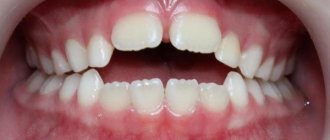At what months do babies start talking?
Speech is an important tool for communication and socialization. It begins to develop from birth. First, the baby makes the vowel sounds “a”, “u”. This is how he expresses his needs.
From the age of two months, babies become more animated, uttering drawn-out sounds more often, giving them an emotional coloring. They start cooing. By two months, the mother already knows the child well, understands what sounds he uses to express joy, hunger, discomfort, and how he tries to make it clear that he is bored.
At the age of three months, the baby begins to make not only vowels, but also consonant sounds (g, x, k, p, b), and combines them in a certain way (“gu”, “agi”, “agu”). At six months, parents notice the baby's babbling. It differs from humming by the repetition of syllables.
For example, a baby can repeat the sounds “pa-pa-pa”, “ba-ba-ba”, “ma-ma-ma” for a long time. He pronounces them unconsciously. The baby begins to understand what adults are telling him. He develops a passive vocabulary. During this time, it is important to communicate with your child as much as possible.
At seven months, the baby continues to babble. At this age, he begins to play with the timbre and volume of his voice: he drawls out sounds, alternating low and high notes.
A passive vocabulary continues to form. The baby begins to imitate the speech of his parents and the sounds made by adults, animals, and cars.
At 9-10 months, the child pronounces new sounds and communicates with gestures. At this age, he is able to pronounce about 10 monosyllabic words: “woof”, “baba”, “koko”. Girls usually develop speech faster than boys. At what time children begin to speak their first words largely depends on the parents: on how they work with the baby, how they communicate with him.
Physical, intellectual and mental development and hereditary predisposition also have a certain influence. Therefore, it is difficult to give an exact answer as to what time the baby will speak. Caring and persistent parents can speed up the onset of this moment.
The more often a child hears the word “mom,” the faster he will learn to pronounce it.
When do children say the word "mom"?
The question of when a child begins to say “mom” is relevant for all mothers. By 10 months, children are already pronouncing monosyllabic words. It is not necessary that a child at this age will say “mom”.
The first word can be “baba”, “dad” or “woof”. But as a rule, by the age of one year, babies already clearly pronounce “mother.” What first word the baby says depends on how the parents communicate with him.
To help your baby start saying “mama” earlier, experts recommend:
- accompany each action with the word “mom” (for example, “mom is feeding Masha”, “mom has come”, “mom is cooking porridge”, “mom is stroking her daughter (son)”);
- play the game “Where is Mom?” Its essence is to cover your face with your hands and ask the baby where mom is. Six-month-old children usually already understand such questions and can point their fingers at people and objects.
Why is the sensitive period so important?
By incorrectly assessing the child’s level of development, a parent risks making mistakes and wasting time. This could have critical consequences. The fact is that for the emergence and development of each function or skill there is a so-called sensitive period, that is, the most favorable period for their formation. Outside this sensitive period, the function is much more difficult to form, which affects the entire course of the baby’s development.
It can be even more difficult for parents to find help that is right for their child. After all, parents mostly get information from the Internet or receive it from friends who have encountered a similar problem. Not always what helps someone else’s child will be useful to yours. Therefore, we repeat once again: contact specialists.
Average age for children to develop conscious speech
At 9-10 months, babies pronounce words unconsciously. They only pronounce various syllables and imitate the speech of their parents. But the baby already understands what adults are telling him, and his vocabulary continues to expand.
Already by 11-12 months, the baby begins to pronounce simple words consciously. Usually these are “mother”, “father”, “woman”, “grandfather”, the names of favorite toys, animals. In total, there are approximately 10 words in the lexicon. By the age of one and a half years, a child can consciously pronounce about 20 words.
By the age of two, many children can already form simple sentences. To stimulate the development of conscious speech in a child, it is necessary to conduct educational activities in the form of a game. For example, Doman cards develop a child well.
They are bright pictures of different subjects (weather, animals, vegetables). It is necessary to show them to the baby and at the same time name what is depicted on them. It is important to talk to your baby as often as possible. When communicating, you should use simple words.
The baby begins to consciously pronounce words closer to 11-12 months.
How to help your child talk
The best way is to create all the conditions for communication. Here are the three most important things every parent should do.
Talk
No need to chat non-stop. Just talk to your child when you spend time together.
- Name the things you hold in your hands or hold out to your baby: “This is a ball. And this is a machine."
- Describe what you are doing: “Now we are putting on pants. And now - a jacket. And let’s go for a walk!”
- Explain what is happening around: “Uh-oh, what a loud car!”, “Kar! It’s a crow cawing,” “But mom’s phone is ringing.”
- Ask questions: “Do you hear dad calling us? Let’s run to him!”, “Is your bunny tired? Does he want to go to bed?
- Sing lullabies.
Read aloud
Reading shows the child that there are many different words, teaches how to form sentences, and demonstrates how an action develops. This encourages him to tell his own stories, such as how dolls play with each other, why the car is hidden, or why he doesn’t want to eat your soup.
Causes and symptoms of speech delay
There is a calendar for the development of speech in children. It is important to compare the information provided with the child's actual data. We must keep in mind that all babies are different.
There are guys who develop quickly and begin to speak earlier or on time. But there are children who are difficult to learn and do not learn new information well.
The development of speech may take a little longer for them. In any case, the child must learn to speak before the age of three. If this does not happen, then pediatricians diagnose speech development delay (SDD).
Symptoms of this condition are:
- silence;
- isolation;
- communication is predominantly by gestures.
Signs of delayed speech development can be noticed in the early stages. To do this, you need to take a closer look at the child.
The main symptoms of IRR:
- the newborn does not make sounds;
- at four months of age, the child does not roar and does not respond to parental requests. The baby is physically passive;
- at 9 months there is no interest in musical toys. The baby does not babble;
- at the age of one and a half years, the baby does not pronounce simple words, does not know his name and is not interested in the world around him;
- at 2 years old, the child cannot answer a simple question, is not able to repeat a simple phrase after adults; at the age of three, he does not communicate using simple sentences.
If parents notice the signs of delayed speech development in a child described above, then they need to visit a pediatrician, consult with an otolaryngologist, neurologist, psychologist or psychotherapist. Dr. Komarovsky does not recommend postponing the solution to the problem of silence.
At 3.5-4 years, a delay in psycho-speech development may occur. It is much more difficult to treat. Unfortunately, today RRD is observed in many children. The reasons can be quite varied. All of them are divided into physiological, psychological, social and pathological.
The physiological group of factors for delayed speech development includes:
- hypotrophy of the muscles of the organs of articulation;
- prematurity (babies born before 37 weeks are usually developmentally delayed);
- asphyxia during childbirth;
- poor heredity (if one of the parents masters speech communication late, then you should not be surprised when the baby also does not start speaking early);
- weak brain activity.
Psychological causes of RDD include:
- stress;
- great fear.
Social factors of speech development delay:
- the family speaks two languages;
- parents have little contact with the child;
- absence of mother, father, guardians;
- pedagogical neglect;
- overprotection (the mother prevents all the child’s wishes and does not stimulate his independent speech activity);
- over-informed environment;
- lack of demand for speech in the family (parents communicate little not only with the baby, but also with each other);
- unfavorable atmosphere in the family.
The pathological causes of FGR are:
- hearing impairment (deafness, hearing loss);
- intrauterine hypoxia;
- post-vaccination complications;
- meningitis;
- autism;
- intrauterine infection;
- encephalitis;
- Down syndrome;
- perinatal encephalopathy;
- frequent and prolonged illnesses during the neonatal period;
- severe brain damage due to falls, blows, and certain diseases.
Most often, RRD is observed with hearing impairment. As is known, the formation of speech occurs with the direct participation of the hearing aid. The baby listens to certain sounds and words, stores them in his memory, and then pronounces them.
The second common cause of developmental disorders is the lack of attention and communication between parents and training sessions. The true cause of RRD can be determined by a doctor after analyzing the child’s living conditions, examination and examination.
Approximately 30% of cases of RRD remain unexplained. It happens that several factors have a negative impact at the same time.
The first manifestations of speech in children are cooing. When they grow up a little, they begin to pronounce simple sound combinations and words (for example, “mom”, “dad”, etc.). The next achievement in the development of a child’s speech is his ability to compose simple sentences from words. But when can we expect a child to achieve this or that achievement in speech development? Let's look at how children begin to talk, how to help them develop these skills, and what abnormalities in speech development a child may have.
How children learn to speak
Children learn to speak gradually, going through several stages in this process. Surprisingly, the first stage takes place in the womb. Studies have shown that in the areas of the fetal brain responsible for speech, activity appears as early as the 7th month of pregnancy. It appears every time mom speaks louder than usual or pronounces words slowly and emphatically. Experts believe that such a change in speech style is a kind of language lesson for the child.
By the end of pregnancy, the fetus can already hear words. Newborn children have limited but important knowledge, for example, the ability to distinguish their native speech from a foreign one. However, the child's speech development occurs step by step.
When children start talking
Babies begin to coo at around two months of age. These sounds form the basis for further speech development. At the age of four months, the child begins to babble. Development continues, and at twelve months the child usually begins to speak simple words. At two years old, the child pronounces words meaningfully, and at three years old, he begins to talk with others. Like the development of any other area, a child’s speech development goes through certain stages.
Stages of child speech development
At a certain age, children reach different indicators of speech development. Let's take a closer look at them.
| Age | Index |
| First stage: 1–3 months | The child coos and makes different sounds in different tones. |
| Second phase: 2–6 months | The child imitates the sounds of the surrounding world, pronounces combinations of vowel sounds and individual consonants ([m], [p], [b], etc.). |
| Third stage: up to 12 months | The child pronounces the first words: “dad”, “mom”, “baba”, interjections “o”, “ou”, etc. to express emotions. |
| Fourth stage: up to 18 months | The child can pronounce 10 or more words, link several words into a simple sentence, and say “no.” |
| Fifth stage: up to 24 months | The child makes sentences of 4–5 words, says simple phrases (for example, “give me more”), words such as “hello,” “goodbye,” “let’s go.” His vocabulary is about 50 words. |
| Sixth stage: up to 36 months | The child can name objects that he sees around him, distinguishes names, gender and age, and can carry on a simple conversation. |
At each stage, the child has its own development indicators. Let's take a closer look at them.
1–3 months
- The child begins to gurgle. These are the first sounds he makes. The child experiments with the vocal apparatus, using sounds to attract the attention of the parents.
- The child makes sounds indicating that he is comfortable . Often parents can hear him pronounce the sounds [m] or [o]. This is how he shows that he is comfortable or calms himself down.
2–6 months
- The child babbles and imitates surrounding sounds. The child babbles, making arbitrary sounds. Most often, in this way he imitates the sounds he hears around him. Through imitation, the child learns new words.
- The child pronounces vowels and sometimes consonants. It is easier for a child to pronounce vowel sounds because he does not have to make complex movements with his tongue. Certain consonant sounds (for example, [p], [b]) are easier to pronounce than others, so children usually pronounce them one of the first.
Up to 12 months
- The child speaks his first words. By the first year, the child speaks the first words with an easy-to-pronounce set of consonants - “mama,” “dad,” “baba.” At first, the child pronounces these words arbitrarily, without putting meaning into them. Gradually he learns to address these words correctly.
- The child pronounces sound combinations for exclamation . You may often hear your child “ouch” when he drops a toy on the floor. Interjections are part of a child’s vocabulary; he begins to use them by the age of one.
12–18 months
- The child says a few words. The first words that a child says are the names of objects that he sees around him (toys, bottle, clothes, etc.). The child names the object that he wants to use at the moment, for example, he can say “bottle” when he is hungry.
- The child says no. The child may shake his head and say “no.” Using the word “no” means better interaction between language and cognitive skills.
18–24 months
- The child repeats the words. By the age of two, the child repeats words and phrases heard from other people. At a younger age, he simply babbled, imitating the speech of those around him, without trying to pronounce words correctly.
- The child pronounces up to 50 words. His vocabulary includes the words "hello", "bye", "let's go", etc. As the child's vocabulary increases, he learns to compose simple sentences consisting of 4-6 words.
24–36 months
- The child uses pronouns in speech. This means that he understands the language rules for using the 1st and 3rd person.
- The child keeps up the conversation. Now you can have a full conversation with your child. Achieving this indicator means that the child has fully mastered all the speech skills that he can achieve in preschool age.
A child develops language skills best when he receives enough support from his parents.
How parents can help their child learn to speak
Let's look at several ways to speed up a child's speech and language development.
1. Start speaking to your child in his language as early as possible. Baby tongue is a child's way of saying words and making sentences. It is simpler and more understandable for a child. Talk to him as early as possible and he will be able to pick up the language at a simple level. Research shows that children whose parents spoke their language from an early age have a larger vocabulary than their peers by age three.
2. Read and sing. This increases the child's interest in new words and sentences. Read age-appropriate books to your child and sing to him. This will stimulate his speech development.
3. Encourage your child to imitate the speech of others. Let him repeat your words to the best of his ability. The child's speech will be slurred at first, but as the child gets older, he will repeat your words more accurately. This will provide the basis for meaningful sentence writing.
4. Describe people and objects. Show your child various objects and name them. Introduce your child to relatives, tell them their names and degree of relationship. The more you use nouns, the more the child associates objects with their names and develops vocabulary.
5. Ask your child questions and keep the conversation going. When your child turns 3, ask him questions if he wants something or has any problem. Questions force the child to look for answers. Also, at the age of three, you can have long conversations with your child to develop his speech skills.
6. If you speak several languages, speak to your child in your native language. Experts advise parents to speak to their child in the language that is most comfortable for them. This way, the child will learn the language better, and it will be easier for parents to monitor the baby’s progress.
The methods discussed will help your child develop speech skills faster and easier. However, on this path you must remove all possible obstacles.
How to ensure proper speech development for your child
Follow the tips below to ensure your child's speech development is healthy.
1. Let your child experiment. Give your child as much time as necessary to learn new words. Allow him to experiment with combinations of consonant sounds - this will help the child develop his speech skills.
2. Eliminate sources of background noise. When reading or singing to your child, turn off the TV and radio and eliminate any possible sources of background noise. This will help the child concentrate and not be distracted.
3. Limit the time your child spends watching a TV or computer screen. Experts note that modern children under three years of age spend too much time watching TV, computers, tablets, etc. Research shows that this slows down their speech development. It is better to devote this time to live communication with the child.
Sometimes children have certain problems with speech development. Parents can help their child cope with them.
What to do if the child does not speak
Sometimes parents feel that their child is lagging behind in speech development. But a slight delay should not be a cause for concern. Delayed speech development is not necessarily a symptom of any disorder. Some children just take longer to start speaking than others. Be patient and support your child.
In some cases, the following problems may occur:
- Babies born prematurely may start speaking later. Remember that premature babies tend to develop language skills later than others, but they catch up over time.
- diseases that a child suffers in the womb or at birth can lead to delays in speech development. Infections suffered by the mother during pregnancy, illnesses suffered by the baby at birth, side effects of medications, and even poor health and low birth weight of the baby can all lead to delays in speech development. However, children make slower progress in developing general language skills.
If you doubt that your child's speech development is progressing at a normal pace, you should pay attention to a number of signs that indicate this.
Danger signal in a child’s speech development
Children with speech delays exhibit the following symptoms:
- At 12 months, the child does not coo and cannot say “dad” or “mama.”
- At 18 months, the child prefers gestures to verbal communication, his vocabulary is only 3-4 words.
- At 24 months, a child cannot repeat words after adults, even if they repeat them several times. He also doesn't answer simple questions.
- At 36 months, the child cannot name objects and the names of his immediate family, does not communicate with his parents, speaks in an unusual tone, and his vocabulary does not develop.
Experts say that speech development delays occur in approximately 20% of all children. In most cases, these delays are temporary, and the child overcomes them as he grows. One way or another, if you are faced with a delay in the speech development of a child, first of all you must understand what caused it.
Causes of speech delays in children
Let's consider factors that can directly or indirectly interfere with the speech development of children:
1. Autism spectrum disorders. An infant with this disorder may have a small vocabulary and difficulty understanding multi-meaning words. A child with autism spectrum disorder cannot carry on a conversation. However, not all cases of autism spectrum disorder lead to delays in speech development; in some cases, speech development proceeds normally.
2. Hearing disorders. Because a child learns speech by listening, any hearing loss can negatively impact speech development. These include congenital diseases of the hearing organs and injuries, leading to the fact that the child cannot hear the speech of others.
3. Neurological disorders. Various neurological problems (cerebral palsy, congenital mental retardation, etc.) can cause delays in speech development. Most of these disorders also cause hearing impairment. In disorders such as apraxia of speech, the functioning of the brain is not impaired, but malfunctions occur in the neurons that control jaw movements.
4. Behavior problems. Some children exhibit language disorders only in certain settings (for example, school). This disorder is called selective muteness. The child may be healthy and just need a boost of self-confidence to begin speaking normally. This disorder is quite rare, occurring in approximately 1% of children.
If you suspect a speech delay in your child, you should contact your pediatrician immediately.
How to determine speech delay in a child
If the pediatrician suspects problems with speech development in a child, he will refer the child for examination to a speech pathology specialist who can determine the delay in speech development. In this case, the following parameters of the child’s speech are examined:
- hearing. Hearing impairment can affect the development of speech skills. Therefore, first of all, if a delay in speech development is suspected, the child’s hearing is examined;
- physical defects. Deformations of the palate or lip may interfere with speech. The child is examined for physical defects of the upper respiratory tract that could potentially cause speech delay;
- speech perception. The extent to which the child can understand and interpret speech is examined;
- expressiveness of speech. It examines how long a child can maintain a conversation and how many words he knows. The clarity of the child's speech is also taken into account;
- use of gestures. Does the child prefer gestures to words? This may be a sign that the child has problems with speech development. During the examination, doctors pay attention to this symptom.
After the examination, the doctor determines the child’s diagnosis. If a child is diagnosed with any disease, he will be prescribed appropriate treatment.
Treatment of speech delays in children
Doctors use speech therapy for treatment. The procedures involved in this process may vary in each individual case. However, there are generally accepted procedures used in the treatment of speech delays in children:
- surgical treatment of hearing or speech defects. If the cause of delayed speech development in a child is physical defects, surgical intervention is used. After this, you can proceed to the next stages of treatment;
- development of speech skills. The child is taught through music, songs, conversations and books. The specialist conducts classes with the child aimed at developing his speech skills appropriate for his age. Conversations with the child help improve his pronunciation;
- strengthening the speech apparatus. To develop correct pronunciation, the child performs exercises aimed at strengthening the muscles of the lower jaw. The doctor may recommend exercises that the child should do while eating to develop proper jaw movements.
The length of treatment and procedure depend on the specific language development problem the child is experiencing. Parents can also help their child cope with these problems.
How parents can help their child cope with speech delays
To help a child overcome speech delays, psychologists recommend that parents take the following measures:
- talk to your child. Young children do not understand the meaning of words, but they hear and respond to sounds. Talk to your child from a very early age, repeat the sounds he makes. This may be a pointless exercise, but it is the basis for further speech development;
- count and name objects for your child. For example, when your child is building a tower of blocks, count the number of blocks out loud so that your child can hear you. Point to objects and name them. Call people in the same room with you by name;
- ask questions. Children understand questions, so ask your child what he wants. If he cries or becomes hysterical, ask him what's wrong. Questions motivate the child to use words instead of gestures to state their needs;
- read to your child. Psychologists recommend reading to children from a very early age. For reading, choose books with pictures: show your child the pictures and name what is depicted in them. As your child gets older, let him choose his own books to read;
- Sing nursery rhymes to your child. Don't underestimate nursery rhymes. They may seem frivolous to you, but in fact they help the child develop speech. Sing songs to your child, read children's poems, and soon he will begin to repeat after you. Young children repeat individual sounds after their parents, while older children try to pronounce whole words. In any case, it helps develop the child’s speech.
Parents usually have many questions about their child’s speech development. Let's try to deal with the most common of them.
Common questions about speech development in children
1. At what age can a child start talking?
The child begins to talk no earlier than 7 months. However, he begins to consciously pronounce words only after 1 year.
2. How do speech and language development differ?
Speech is the ability to communicate using verbal means of communication. Language includes both verbal and non-verbal means, as well as written language. Children cannot write, so newborns most often use nonverbal communication. Verbal communication is an indicator of progress in a child's development.
3. When do children begin to speak fluently?
The skills needed for fluent speech usually develop in a child around 4–5 years of age. At 5 years old, the child usually speaks fluently.
4. How do pediatricians assess speech delays in children?
Pediatricians use special procedures to determine how a child responds to words and questions. As a result of such tests, they determine the level of speech development of the child and possible problems.
5. How are speech delays in children treated?
It depends on the reason causing the delay. For example, in the case of autism, there is no cure for speech delay, but it can be successfully managed by changing the child's lifestyle. Disorders such as apraxia are treated with psychotherapeutic methods. In any case, successful treatment of speech development disorders is facilitated by early identification of the problem and intervention.
Children are naturally inclined to learn to speak. Scientists say that they have a genetic predisposition to this. However, parents can encourage the child to develop speech at a faster pace. Let your child speak and make sure he reaches speech development milestones on time. With a little effort, your child will not be able to be silenced in a few years.
Periods of crisis in the development of a child’s speech
Pediatricians distinguish three critical periods in the development of speech, during which particularly intensive development occurs and at the same time there is an increased sensitivity of the nervous system to unfavorable factors. It is important to know these stages and be attentive to your baby when they occur.
It is important to know the critical stages and be attentive to the baby when they occur:
- The first critical period is observed at 1-2 years. At this time, the active development of cortical speech zones occurs. The influence of unfavorable factors can cause RRD or alalia;
- the second period is 3 years. Intensive development of speech is observed. At this time, stuttering and mutism may occur;
- the third lasts from 6 to 7 years. At this age, central nervous system disorders are possible, leading to stuttering. With organic damage to the brain, aphasia occurs.
Thus, the child begins to pronounce his first words at about nine months of age. They are repeated syllables that the baby pronounces unconsciously. During this period, parents can hear “mom,” “baba,” and “dad.” Some children experience developmental delays.
They can be triggered by hearing impairment, lack of parental attention and other social, psychological, pathological and physiological reasons. In order for a child to start speaking faster, it is necessary to communicate with him more and conduct developmental activities.










